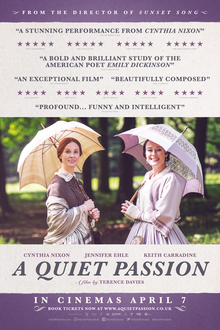
It’s purely by coincidence that we watched two films with such similar titles in the same week. I don’t really read serious literature and even less poetry but if I can be said to like any poet, it should be Emily Dickinson. Since my wife usually likes biographies of writers, especially female ones, I thought this would be a good bet for both of us. Unfortunately even the prose of the ordinary dialogue in here might as well be the English equivalent of Classical Chinese and I’m afraid my wife got very little out of this film.
This film covers the poet’s life beginning with her time attending a seminary at Mount Holyoke, which would prove to be one of her rare sojourns away from home. She earns the ire of the headmistress when she declines to adopt a submissive attitude to religion and is overjoyed when her family comes to bring her home to Amherst. At home she receives permission from her father to write her poetry at night and henceforth rarely steps outside of the house. She befriends Vryling Buffam who proves to be as quick-witted and perhaps even more mischievous than Emily herself. Her close intimacy with her sister Lavinia and her brother Austin is easily evident as is her deep affection for her mother and her father. Her brother’s marriage to Susan is a cause for delight but except for an infatuation for Charles Wadsworth, a married minister, Emily would never be involved in a romance herself though she dreams of it.
As I noted this isn’t the easiest film to watch and it’s difficult to imagine it having any appeal to anyone who isn’t at least somewhat familiar with the poet’s body of work. Lead actress Cynthia Nixon recites plenty of poems at appropriate moments such as “I’m Nobody! Who are you?” at the birth of Austin’s child. Practically every single line of dialogue is suffused with a love of the English language and celebrates cleverness with words, which makes it supremely fun to whose who can follow along but doesn’t help comprehension in the least. Unfortunately one could say that it goes too far. The character of Vryling Buffam serves as an excellent foil to Emily and their quick repartees is a great source of humor, while also embodying a sort of early feminist. It turns out however she was too good to be true as this is a fictional character created just for this film and is a sign that the film is trying too hard in this respect. It has to be said that almost the entirety of the film takes place within the confines of Emily’s beloved house so perhaps director Terence Davies who also wrote its screenplay felt the need for some extra liveliness.
Though set only within the confines of a single house, I love how this film’s themes range far and wide. Emily’s bitterness over the limited choices of the women of her time is palpable as is how fiercely she guards the independence of her thoughts and beliefs. It isn’t that she is an atheist, it is that she refuses to subordinate the precise nature of what she believes to anyone other than herself. The film captures plenty of other aspects of life such as her longing to be acknowledged in her lifetime, which never came about as her first collection of poetry was published only after her death, and her own conflicted emotions with regards to romance. One of my favorite scenes is when she dismisses the need for it early on simply because she is so contented with the family that she has and could not imagine anything better. Also poignant is how a friend marrying and moving away has all the finality of death.
A flaw might be that the camera is a touch too voyeuristic towards the end, focusing with disturbing obsession over Emily wheezing and moaning as she suffers from the disease that would kill her. This shouldn’t really be the point of the film. However upon a cursory reading of her biography, it struck me how often death comes up as friends, teachers and family members die at regular intervals. It is easy to forget for us modern humans how short and fragile lives could be even not so long ago and explains why Dickinson’s poetry is often so morbid.
It should be noted that films are still primarily a visual medium and therefore aren’t the way best way to showcase poetry. Even though the poetry here isn’t too difficult to understand, you do still need to concentrate to properly appreciate them and the images however appropriate can be a distraction. This is another reason why this film probably appeals only to those who are already familiar with the poetry. I did like the previous film by Terence Davis that I’d watched as well, Sunset Song, probably more than it deserves. But A Quiet Passion I can say without apology is great. More than anything else, the director’s immense love and respect for Dickinson shines through. This is much more than I can say for many biographical films which attempt to introduce a historical personage to the mass market and end up making a hash of things. For me this puts Terence Davies on the watchlist for good directors and I note that he does appear to specialize in adaptations from literary sources.
One thought on “A Quiet Passion (2016)”